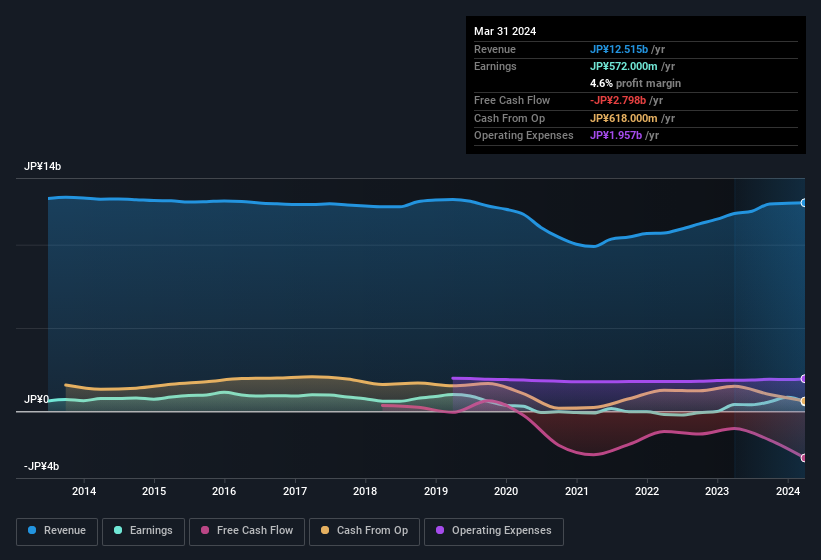- Japan
- /
- Marine and Shipping
- /
- TSE:9193
We Think Shareholders Should Be Aware Of Some Factors Beyond Tokyo KisenLtd's (TSE:9193) Profit

The latest earnings release from Tokyo Kisen Co.,Ltd. (TSE:9193 ) disappointed investors. We did some digging and found some underlying numbers that are worrying.
See our latest analysis for Tokyo KisenLtd

A Closer Look At Tokyo KisenLtd's Earnings
One key financial ratio used to measure how well a company converts its profit to free cash flow (FCF) is the accrual ratio. The accrual ratio subtracts the FCF from the profit for a given period, and divides the result by the average operating assets of the company over that time. You could think of the accrual ratio from cashflow as the 'non-FCF profit ratio'.
Therefore, it's actually considered a good thing when a company has a negative accrual ratio, but a bad thing if its accrual ratio is positive. That is not intended to imply we should worry about a positive accrual ratio, but it's worth noting where the accrual ratio is rather high. Notably, there is some academic evidence that suggests that a high accrual ratio is a bad sign for near-term profits, generally speaking.
For the year to March 2024, Tokyo KisenLtd had an accrual ratio of 0.21. Therefore, we know that it's free cashflow was significantly lower than its statutory profit, which is hardly a good thing. Over the last year it actually had negative free cash flow of JP¥2.8b, in contrast to the aforementioned profit of JP¥572.0m. Coming off the back of negative free cash flow last year, we imagine some shareholders might wonder if its cash burn of JP¥2.8b, this year, indicates high risk. However, that's not all there is to consider. The accrual ratio is reflecting the impact of unusual items on statutory profit, at least in part.
Note: we always recommend investors check balance sheet strength. Click here to be taken to our balance sheet analysis of Tokyo KisenLtd.
How Do Unusual Items Influence Profit?
The fact that the company had unusual items boosting profit by JP¥280m, in the last year, probably goes some way to explain why its accrual ratio was so weak. While we like to see profit increases, we tend to be a little more cautious when unusual items have made a big contribution. When we crunched the numbers on thousands of publicly listed companies, we found that a boost from unusual items in a given year is often not repeated the next year. And, after all, that's exactly what the accounting terminology implies. We can see that Tokyo KisenLtd's positive unusual items were quite significant relative to its profit in the year to March 2024. All else being equal, this would likely have the effect of making the statutory profit a poor guide to underlying earnings power.
Our Take On Tokyo KisenLtd's Profit Performance
Summing up, Tokyo KisenLtd received a nice boost to profit from unusual items, but could not match its paper profit with free cash flow. For the reasons mentioned above, we think that a perfunctory glance at Tokyo KisenLtd's statutory profits might make it look better than it really is on an underlying level. So while earnings quality is important, it's equally important to consider the risks facing Tokyo KisenLtd at this point in time. When we did our research, we found 4 warning signs for Tokyo KisenLtd (2 shouldn't be ignored!) that we believe deserve your full attention.
In this article we've looked at a number of factors that can impair the utility of profit numbers, and we've come away cautious. But there is always more to discover if you are capable of focussing your mind on minutiae. Some people consider a high return on equity to be a good sign of a quality business. So you may wish to see this free collection of companies boasting high return on equity, or this list of stocks with high insider ownership.
Valuation is complex, but we're here to simplify it.
Discover if Tokyo KisenLtd might be undervalued or overvalued with our detailed analysis, featuring fair value estimates, potential risks, dividends, insider trades, and its financial condition.
Access Free AnalysisHave feedback on this article? Concerned about the content? Get in touch with us directly. Alternatively, email editorial-team (at) simplywallst.com.
This article by Simply Wall St is general in nature. We provide commentary based on historical data and analyst forecasts only using an unbiased methodology and our articles are not intended to be financial advice. It does not constitute a recommendation to buy or sell any stock, and does not take account of your objectives, or your financial situation. We aim to bring you long-term focused analysis driven by fundamental data. Note that our analysis may not factor in the latest price-sensitive company announcements or qualitative material. Simply Wall St has no position in any stocks mentioned.
About TSE:9193
Tokyo KisenLtd
Engages in the tugboat business in Japan and internationally.
Proven track record with adequate balance sheet.
Market Insights
Community Narratives





